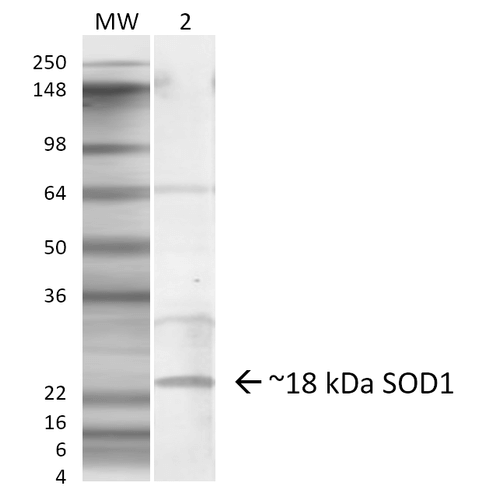Anti-Superoxide dismutase 1 Antibody (13064)
Data
 Western blot analysis of Mouse Lung showing detection of ~18 kDa SOD1 (EDI) protein using Rabbit Anti-SOD1 (EDI) Polyclonal Antibody (13064). Lane 1: Molecular Weight Ladder. Lane 2: Mouse Lung. Load: 20 µg. Primary Antibody: Rabbit Anti-SOD1 (EDI) Polyclonal Antibody (13064) at 1:1000. Predicted/Observed Size: ~18 kDa.
Western blot analysis of Mouse Lung showing detection of ~18 kDa SOD1 (EDI) protein using Rabbit Anti-SOD1 (EDI) Polyclonal Antibody (13064). Lane 1: Molecular Weight Ladder. Lane 2: Mouse Lung. Load: 20 µg. Primary Antibody: Rabbit Anti-SOD1 (EDI) Polyclonal Antibody (13064) at 1:1000. Predicted/Observed Size: ~18 kDa. - -
- -
Antibody DetailsProduct DetailsReactive Species Human ⋅ Mouse ⋅ Rat Host Species Rabbit Immunogen Peptide corresponding to exposed dimer interface (EDI) region at the N-terminus of SOD1. Product Concentration Lot Specific Formulation PBS, pH 7.4, 50% glycerol, 0.09% sodium azide. State of Matter Liquid Product Preparation Purified by peptide affinity chromatography Storage and Handling This antibody is stable for at least one (1) year at -20°C. Regulatory Status For in vitro investigational use only. Not intended for diagnostic or therapeutic applications. Country of Origin USA Shipping Next Day 2-8°C Applications and Recommended Usage? Quality Tested by Leinco Immunoblotting: use at 1ug/mL. A band of ~18kDa is detected.
These are recommended concentrations. Endusers should determine optimal concentrations for their applications. Each investigator should determine their own optimal working dilution for specific applications. See directions on lot specific datasheets, as information may periodically change. DescriptionDescriptionSpecificity This antibody recognizes human, mouse, and rat SOD1. Background Superoxide dismutase (SOD) is an endogenously produced intracellular enzyme that catalyzes
the dismutation of the superoxide radical O2- to oxygen and hydrogen peroxide which are then
metabolized to H2O and O2 by catalase and glutathione peroxidase. SODs play an important role
in antioxidant defense mechanisms. Three different SOD isoenzymes are found in mammalian
cells: SOD1, SOD2, and SOD3. SOD1 contains Cu and Zn ions and exists as a homodimer in
cell cytoplasm. The two subunits of ~16kDa each are linked by two cysteines that form an intrasubunit disulfide bridge. Misfolding of SOD1 has been implicated in Amyotrophic Lateral
Sclerosis (ALS). Function Destroys radicals which are normally produced within the cells and which are toxic to biological systems. {PubMed:24140062}. NCBI Gene Bank ID UniProt.org Research Area Enzymes References & CitationsTechnical ProtocolsCertificate of Analysis |
 Products are for research use only. Not for use in diagnostic or therapeutic procedures.
Products are for research use only. Not for use in diagnostic or therapeutic procedures.


